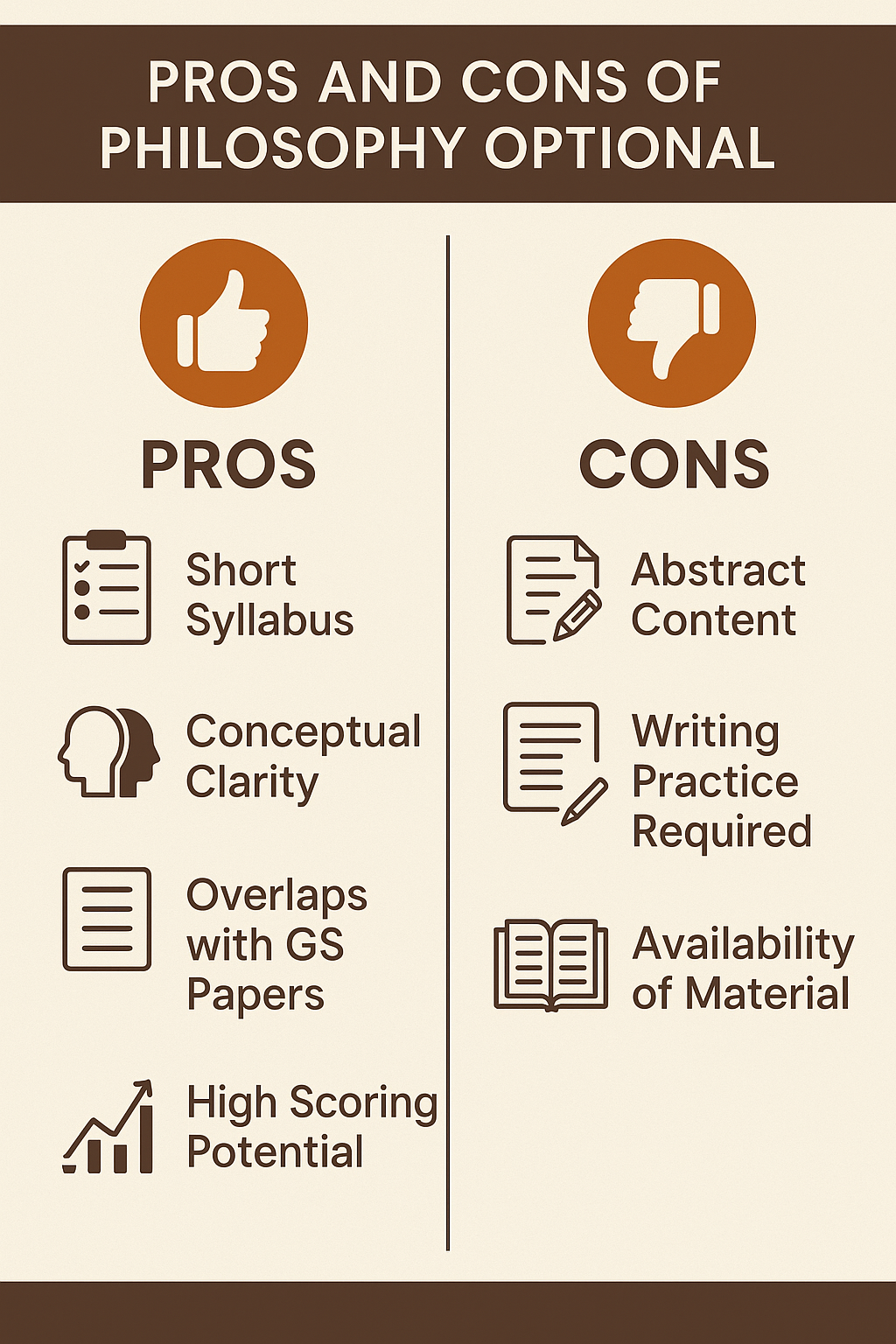
07 Jul UPSC Philosophy optional
UPSC Philosophy Optional: Syllabus, Books, PYQ & Preparation Guide
Why Choose Philosophy Optional for UPSC?
- No prior background required — accessible even to non-humanities students
- Concise syllabus compared to other optional subjects
- Highly scoring if answer writing is strong
- Helps in GS Paper IV (Ethics) and Essay writing
- Improves critical and analytical thinking skills
UPSC Philosophy Optional Syllabus
The syllabus is divided into two papers:
Paper I: Indian and Western Philosophy
- Plato, Aristotle, Descartes, Spinoza, Leibniz
- Locke, Berkeley, Hume
- Kant, Hegel, Wittgenstein
- Logical Positivism, Phenomenology, Existentialism
- Indian schools: Samkhya, Yoga, Vedanta, Nyaya, Buddhism, Jainism
Paper II: Socio-Political Philosophy and Philosophy of Religion
- Justice, Equality, Liberty, Sovereignty
- Marxism, Liberalism, Anarchism
- Crime, Punishment, Corruption, Caste & Gender Issues
- Faith, Reason, Problem of Evil, Liberation and God
Download UPSC Philosophy Optional Syllabus PDF:
UPSC Philosophy Optional Syllabus_Hindi Download
Best Books for UPSC Philosophy Optional
Books for Indian Philosophy
- Indian Philosophy – Radhakrishnan (Volume 1 & 2)
- Indian Philosophy – Dutta & Chatterjee
- A Critical Survey of Indian Philosophy – C.D. Sharma
Books for Western Philosophy
- A Critical History of Western Philosophy – Y. Masih
- Western Philosophy – Frank Thilly
- Introduction to Western Philosophy – Donald Palmer (for basic concepts)
Books for Socio-Political Philosophy
- Social and Political Philosophy – OP Gauba
- Political Theory – Rajeev Bhargava
Books for Philosophy of Religion
- Philosophy of Religion – John Hick
- An Introduction to the Philosophy of Religion – Brian Davies
UPSC Philosophy Optional Previous Year Questions (PYQ)
Practicing PYQs is crucial for scoring high marks. Below are the key trends:
- Repeated questions from Plato, Kant, Samkhya, Vedanta, and Existentialism
- Conceptual clarity in Western thinkers is rewarded
- Indian philosophy is mostly factual but demands comparative analysis
- Paper II is highly dynamic — current events often influence socio-political themes
How to use PYQs effectively?
- Sort questions topic-wise
- Make a table of repetitive questions
- Write model answers and get them evaluated
Strategy to Prepare Philosophy Optional for UPSC
- Understand the Syllabus: Break it down into micro topics from both Paper I and II.
- Start with Indian Philosophy: It is more structured and factual, good for quick scoring.
- Read Western Thinkers Conceptually: Understand their logic, theories, and interlinkages.
- Make Short Notes: Summarize complex concepts in bullet points or diagrams.
- Practice Answer Writing: Begin with 10 markers, then move to 15 and 20 markers.
- Focus on Diagrams & Comparisons: Use tables and comparative charts wherever possible.
- Revise Frequently: Especially philosophical terms, thinkers, and key debates.
- Join a Test Series: To improve writing speed and get feedback.
Topper Tips on Philosophy Optional
“Don’t mug up theories. Internalize them. Use real-life analogies. That’s what fetches you marks in Philosophy.” – AIR 36
“Use previous year questions as your compass. They tell you exactly what UPSC wants.” – AIR 105
Best history optional coaching in delhi
Common Mistakes to Avoid
- Ignoring Paper II – Most students focus too much on Indian and Western and neglect Socio-political philosophy
- Writing answers in a generic GS-style – Instead, use philosophical language
- Skipping PYQs – These are your real treasure for predicting questions
Conclusion: Is Philosophy Optional Worth It?
Absolutely. UPSC Philosophy optional is a brilliant choice for aspirants who are analytical and enjoy abstract thinking. With the right books, consistent answer writing, and a conceptual approach — you can easily score 280+ marks. Whether you are from Science, Commerce, or Arts — philosophy is equally accessible and enriching.
Don’t forget to download the syllabus PDFs:




No Comments